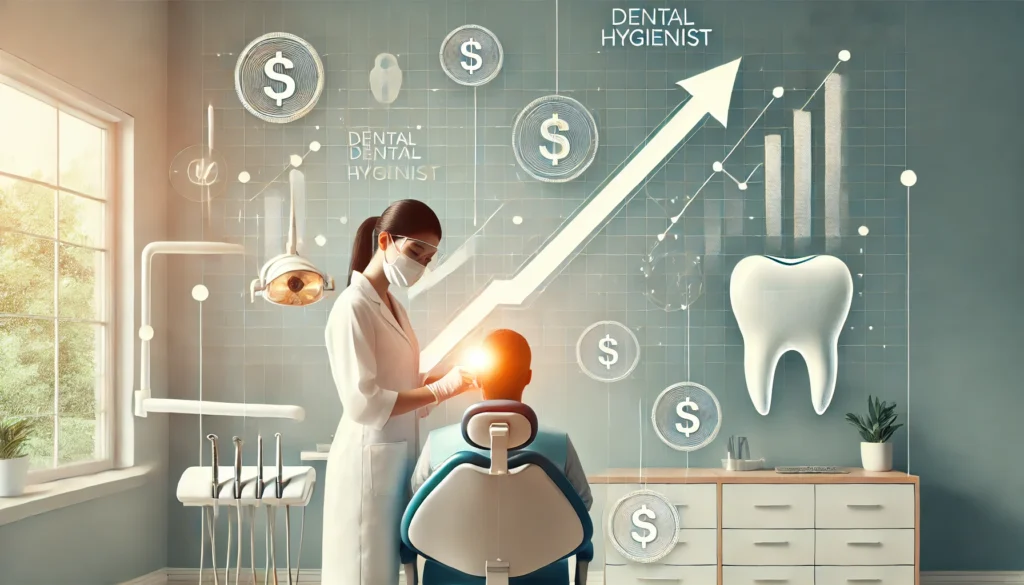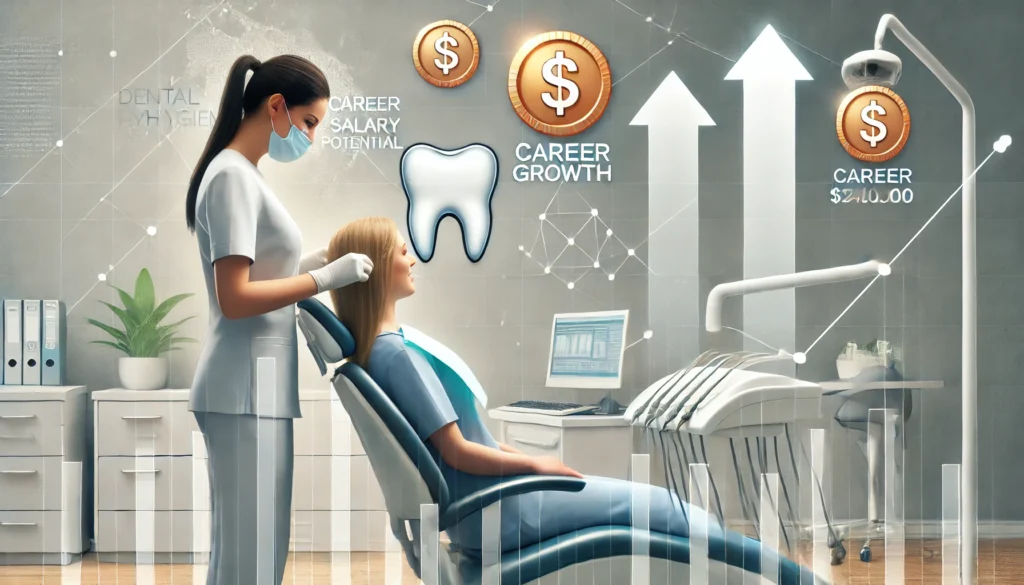Are you a dental hygienist wondering how to raise your salary and earn what you’re truly worth? Many dental hygienists experience frustration with stagnant wages, especially after years of experience and skill growth. Despite playing a crucial role in patient care, salary raises in this field can be slow and often do not reflect a hygienist’s true value. If you’re a dental hygienist looking to boost your income, you must learn effective strategies to negotiate higher pay and secure better-paying job opportunities.
This guide provides actionable tips and methods to help you break free from stagnant wages, improve your market value, and raise your salary as a dental hygienist.

1. Get Certified to Raise Your Dental Hygienist Salary and Expand Your Skill Set
Gaining additional certifications is one of the most effective ways to raise your salary as a dental hygienist. Specialized skills make you more valuable to your employer and give you the leverage needed to negotiate a higher salary.
Certifications That Boost Salary:
- Local Anesthesia Certification: Hygienists licensed to administer local anesthesia often earn more due to the added responsibilities and skills required.
- Laser Certification: Laser therapy in periodontal treatments is growing in popularity, and hygienists trained in this area can command higher pay.
- Expanded Function Dental Hygienist (EFDH): With this certification, dental hygienists can perform more advanced procedures, reducing dentists’ workload and increasing their market value.
Why Certification Matters:
By demonstrating your commitment to professional growth and adding specialized skills to your repertoire, you significantly raise your worth in the job market. Employers are often willing to pay more for hygienists who can perform a wider range of services, such as administering anesthesia or performing laser treatments.
2. Seek Employment in High-Paying Locations
Where you work can greatly influence your dental hygienist salary. Salaries for dental hygienists vary widely based on location due to differences in demand, cost of living, and state regulations.
Top-Paying States for Dental Hygienists:
- Alaska: $107,190 annually
- California: $106,240 annually
- Washington: $101,920 annually
- Nevada: $98,290 annually
- New Jersey: $97,580 annually
Why Location Matters:
- Cost of Living vs. Salary: High-paying states typically have a higher cost of living, but they also provide more opportunities for salary growth. If relocating is an option, moving to a high-paying state can instantly boost your income.
- Demand for Dental Hygienists: Some states have a higher demand for hygienists due to population growth or a shortage of dental professionals. This demand can translate into better salaries and more job openings.
Professionals can explore healthcare salary variations across the U.S. and consider locum tenens roles for flexible, high-earning opportunities to maximize income potential.

3. Leverage Your Experience to Raise Your Dental Hygienist Salary
Experience plays a critical role in salary negotiations. The longer you’ve been in the field, the more valuable you become—both in clinical skills and the relationships you build with patients.
How to Leverage Experience:
- Highlight Your Patient Relationships: Experienced dental hygienists often have loyal patient bases. Emphasizing your positive impact on patient retention can give you a strong negotiating point for higher pay.
- Document Success: Track your accomplishments, such as patient feedback, productivity improvements, or contributions to office efficiency. Demonstrating your achievements will make it easier to justify a raise.
Negotiation Tips for Experienced Hygienists:
- Research Salary Benchmarks: Use platforms like the U.S. Bureau of Labor Statistics or Glassdoor to find the average salary for dental hygienists in your area. If your current salary is below average, use this data to support your request for a raise.
- Request Annual Reviews: Ask for one if your practice doesn’t offer annual performance reviews. This provides a structured opportunity to discuss your salary and showcase your value to the practice.
4. Work in Specialized Dental Practices
Dental hygienists working in specialized dental practices, such as periodontics or orthodontics, earn higher salaries than those in general dentistry. Specialized practices often require additional skills and knowledge, which can command higher pay.
Types of Specialized Practices:
- Periodontics: Hygienists specializing in gum disease treatments are in high demand and can earn more due to the complexity of the procedures.
- Orthodontics: Working alongside orthodontists requires expertise in oral health maintenance for patients undergoing orthodontic treatment, offering opportunities for higher salaries.
- Pediatric Dentistry: Hygienists who focus on children’s dental health may receive higher compensation, especially in practices with a high patient volume.
5. Explore Non-Clinical Roles for Dental Hygienists
To raise income without changing clinical settings, consider non-clinical roles that leverage your dental hygiene expertise. These roles often come with higher pay and additional benefits.
Non-Clinical Roles to Consider:
- Dental Hygiene Educator: If you enjoy teaching, becoming a dental hygiene educator at a community college or university can be lucrative. Salaries for educators are often higher than those for clinical hygienists, especially at the college level.
- Corporate Dental Trainer: Dental supply companies and manufacturers often hire dental hygienists to train other professionals on using their products.
- Dental Office Manager: With your dental hygiene background, moving into office management can offer a higher salary, especially with your clinical and administrative knowledge.

6. Continue Your Education with a Bachelor’s or Master’s Degree
For long-term career growth, pursuing a Bachelor’s or Master’s in dental hygiene or a related field can boost your earning potential.
Benefits of Advanced Education:
- raised Salary: Hygienists with advanced degrees typically earn higher salaries and have more opportunities for career advancement.
- Expanded Career Opportunities: A bachelor’s or master’s degree opens the door to roles such as teaching, research, or public health, all offering higher pay than standard clinical positions.
Programs to Consider:
- Bachelor of Science in Dental Hygiene (BSDH): This degree allows you to build on your knowledge of dental hygiene while preparing for higher-level clinical practice or education roles.
- Master of Science in Dental Hygiene (MSDH): This degree focuses on advanced clinical care, research, and education, equipping you for leadership roles in the dental field.
7. Raise Your Dental Hygienist Salary with Confident Negotiation
Many dental hygienists hesitate to negotiate their salary, but this is one of the most effective ways to raise your earnings. Whether starting a new job or looking to boost your current pay, learning to negotiate is essential.
Tips for Successful Salary Negotiation:
- Research Local Salaries: Use resources like the U.S. Bureau of Labor Statistics to determine your area’s average dental hygienist salary. Being informed about salary benchmarks will give you confidence during negotiations.
- Highlight Your Value: Emphasize your value to the practice, whether it’s your experience, certifications, or patient retention rates.
- Be Professional and Assertive: Approach salary negotiations professionally and assertively. Be prepared to discuss specific figures, and don’t be afraid to ask for a salary that reflects your worth.
If your employer doesn’t meet your salary expectations, consider exploring higher-paying opportunities elsewhere.
Looking to increase your earning potential in healthcare? Discover comprehensive salary negotiation strategies tailored to healthcare professionals.

Conclusion: Take Control of Your Dental Hygienist Salary
Breaking free from stagnant pay requires a proactive approach. You can significantly raise your dental hygienist salary by gaining certifications, exploring new job markets, leveraging your experience, and negotiating with confidence. Whether you are a new hygienist or a seasoned professional, these strategies will help you maximize your earning potential and achieve long-term financial growth.







